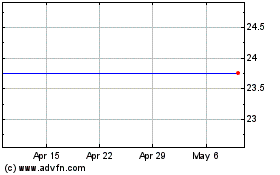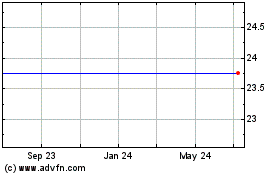Symantec Slashes Quarterly Guidance; CEO to Step Down -- Update
April 28 2016 - 4:57PM
Dow Jones News
By Robert McMillan and Nathan Becker
Symantec Corp., best-known for its "antivirus" computer-security
software, is again looking for a chief executive, after the company
slashed its financial forecast Thursday and said CEO Michael Brown
would step down.
A pioneer in the growing market for cybersecurity products,
Symantec has struggled to diversify amid competition from younger
rivals such as FireEye Inc. and Palo Alto Networks Inc.
Symantec's next CEO will be the company's fourth in as many
years. Mr. Brown, the former chief executive of disk-drive maker
Quantum Corp., refocused the company on security, in particular on
efforts to predict threats, and to track and respond to hackers
once they are inside a network.
The company said he would remain until a successor is named. On
Thursday, it named Ajei Gopal as interim president and operating
chief, part of an "office of the president" that includes other
executives who will help fill the management void until the new CEO
is hired. Mr. Gopal, who previously worked at Symantec, was most
recently an operating partner at private-equity firm Silver Lake,
which invested $500 million in Symantec in February.
Antivirus software, which emerged at Symantec and elsewhere in
the late 1980s, aimed to keep hackers out of networks but proved
less effective in recent years as hacking techniques evolved.
In January, Mr. Brown completed the sale of the company's
Veritas data-storage division to Carlyle Group for $7.4 billion.
Symantec was forced to slash the Veritas sale price by $600 million
because of "uncertainties" about the deal, the company said.
Symantec had bought Veritas for $10.2 billion in 2005 in an attempt
to diversify its business, but it proved to be an unwieldy
distraction
"They made a massive miss-turn when they bought Veritas," said
Brent Thill, an analyst with UBS Group. "They went down a gravel
road that went into a snake pit and then into a sewer."
For its fiscal fourth quarter, which ended April 1, Symantec
said it expects revenue of $873 million, down from prior guidance
of $885 million to $915 million. It also expects adjusted earnings
of 22 cents, below its prior range of 24 cents to 27 cents.
Shares fell 6.7%, or $1.22, to $16.89. Symantec shares are down
32% over the past year.
Demand for Symantec's antivirus software has been stagnant for
years. In 2015, the company's consumer business shrunk by 9% to
$1.9 billion, roughly the same level as in 2010. Corporate security
products, including corporate antivirus and server-security
technologies, slipped 2% last year to $2.1 billion.
Like other technology giants, Symantec has struggled to respond
to changing corporate buying habits. But Symantec's missteps are
even more remarkable, Mr. Thill said, because the company has a
long-established foothold in the fast-growing market for
computer-security products.
"Symantec can't grow, and they're in the hottest space of IT
spend," Mr. Thill said. "Either your sales force doesn't know what
it's doing, or your products are not very good, or it's a
combination of both."
During a conference call with analysts Thursday, Mr. Brown
blamed the company's poor results on a slowdown in sales of
Symantec's traditional products along with a shift toward
subscription products, with their deferred-revenue streams, as
reasons for the company's shortfall.
Symantec declined to make Mr. Brown available for an
interview.
Write to Robert McMillan at Robert.Mcmillan@wsj.com and Nathan
Becker at nathan.becker@wsj.com
(END) Dow Jones Newswires
April 28, 2016 16:42 ET (20:42 GMT)
Copyright (c) 2016 Dow Jones & Company, Inc.
Symantec (NASDAQ:SYMC)
Historical Stock Chart
From Mar 2024 to Apr 2024

Symantec (NASDAQ:SYMC)
Historical Stock Chart
From Apr 2023 to Apr 2024
